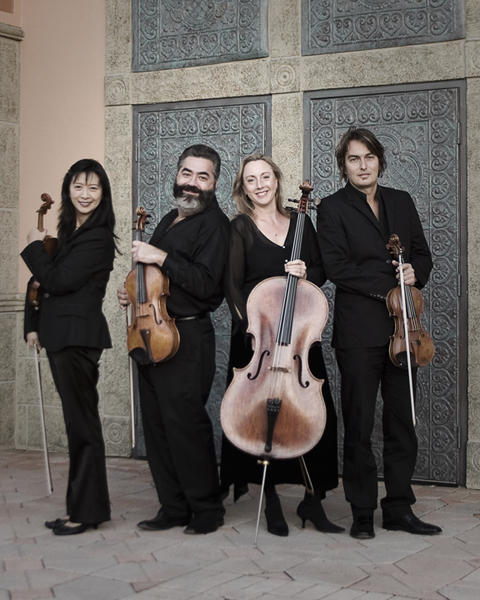Delray Quartet uneven in Mozart and Borodin
 From the vintage-1926 hotel music room to the drink-in-hand audience, the popular program selections and the show-tunes encores, there’s always a touch of the salon at a Delray String Quartet concert.
From the vintage-1926 hotel music room to the drink-in-hand audience, the popular program selections and the show-tunes encores, there’s always a touch of the salon at a Delray String Quartet concert.
On Sunday afternoon, it was the Borodin Second Quartet and two Jerome Kern songs that added the easy-listening sensibility to the proceedings at the Colony Hotel in Delray Beach, and it was this music in which the foursome sounded most comfortable. Whether that is a model on which the greatest success in quartet playing can be based is up for debate, and something the group should consider as its fifth season continues.
The first half of Sunday’s concert, the second in the quartet’s season, featured John Dee, former principal oboe of the Florida Philharmonic Orchestra, who has recently relocated to chilly Chicago. Dee joined the quartet for the Oboe Quintet in C minor of Mozart, which is an arrangement by oboist and educator Humbert Lucarelli of the K.406 String Quintet, which the composer himself transcribed from its original incarnation as a serenade for wind octet (K. 388).
In any of its forms, this is tense, agitated music, in a key that brought out Mozart’s most serious side, as it also did for Beethoven. It received a somewhat uneven performance overall, largely because of a lack of basic, crisp ensemble, sometimes at critical junctures, such as the ritard before the recap in the first movement. More importantly overall, there was a general sense of indirection that left no room for the inner tautness that drives music like this and makes it a compelling journey for the listener.
Dee has a commanding, noble sound that blended well with the four members of the quartet – violinists Mei Mei Luo and Laszlo Pap, violist Richard Fleischman and guest cellist Claudio Jaffe – but he was not at his best Sunday, flubbing the second half of the main theme of the Andante both times. On the other hand, he was a good leader in the Minuet that followed, setting a firm pace and a forceful tone; unhappily, tuning problems in the movement’s major-key trio harmed the effect Mozart was aiming for.
Tuning was actually a problem for much of the afternoon as the players struggled against the high humidity of the Colony music room, which isn’t air-conditioned. That might also have contributed to the mushiness of the Mozart finale, a theme and variations which had little of the sense of sport and inventiveness it needed to be effective.
The second half of the concert contained the popular D major Quartet of Alexander Borodin, which is a classic of the literature, full of exotic-flavored melodies and attractive string colors. It also yielded Baubles, Bangles and Beads (second movement) and This Is My Beloved (the third movement Notturno) for Broadway thievery in 1953’s Kismet. The celebrated Notturno came off best, with lovely playing by Jaffe in the first appearance of the famous tune and good collaborative work by the whole group in the contrasting section, with its scales and trills climbing out of Borodin’s shape-shifting late-Romantic Russian harmonies.
The outer movements were less successful, with the opening marred again by uncertain ensemble (the first appearance of the Animato music, notably) and a poky tempo that brought a bit too much dreaminess to the table. The Finale, which started with badly out-of-tune unison octaves in the first and second violins, is a difficult movement to bring off, with its sudden silences and tempo changes. But one thing it has to have is some sense of accented pulse in order to work. This is especially true of the rising chromatic-scale theme that dominates the movement; without emphasis, it’s just a group of notes sliding upward, but with them it’s an exciting, unstoppable force.
For an encore, the quartet played a 1942 arrangement of two Kern songs, opening with Yesterdays before segueing into the main event, Smoke Gets in Your Eyes. This was an effective arrangement that was very much of its period, and the Delrays played it with real warmth.
The Delray String Quartet, which will settle into its new lineup (cellist Susan Moyer Bergeron will join the group permanently) for next month’s concert, remains an ensemble at something of a crossroads. Last month, it released a respectable disc of two standard works by Dvorak, which represents a real advance, but it also must fight the weather each time it gives a concert, something that most other performing ensembles here don’t have to do.
It’s long past time to hear this group somewhere other than the Colony (charming though it is), where the environment can literally be more controlled and the musicians can concentrate on the pieces rather than the distractions of having to give what essentially are outdoor performances each time. Given that its next concert contains a world premiere of a piece by a contemporary American composer — Thomas Sleeper’s Third Quartet – the question of this group’s future direction becomes even more urgent.
The Delray String Quartet’s next concert is 4 p.m. Sunday, Feb. 1, at the Colony Hotel in Delray Beach. The group will perform the premiere of Thomas Sleeper’s String Quartet No. 3 and Brahms’ Clarinet Quintet, with Paul Green. Call: 561-213-4138.
Greg Stepanich has covered classical music, theater and dance for 25 years at newspapers in Illinois, West Virginia and Florida. He worked for 10 years at The Palm Beach Post, where he was an assistant business editor and pilot of Classical Musings, a classical music blog. He now blogs for the Palm Beach ArtsPaper at www.pbartspaper.com and at classicalgreg.wordpress.com. He also works as a freelance writer and composer.
Posted in Performances
Leave a Comment
Mon Jan 5, 2009
at 9:43 am
No Comments




